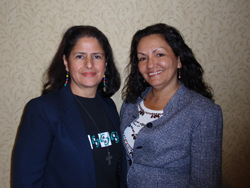Last month’s Ecumenical Advocacy Days brought many Christians to Washington to learn about and advocate for gender justice and women’s issues.
For two leaders in the Presbyterian Church of Colombia (Iglesia Presbiteriana de Colombia, or IPC), the weekend event was just the beginning of a longer stretch in the United States. The Revs. Gloria Ulloa and Adelaida Jiménez Cortes spent about two weeks in the country, speaking with churches, seminaries and policymakers.
But first they attended Ecumenical Advocacy Days, where they participated in a panel discussion about women resisting militarization in Colombia. Ulloa and Jiménez later sat down with the Presbyterian News Service to talk more about their trip, the IPC and the women’s movement in Colombia. Their comments were translated from Spanish by the Rev. Shannan Vance-Ocampo, director of Colombia Programs for the Presbyterian Peace Fellowship, and the Rev. Linda Eastwood, coordinator of the Colombia Accompaniment Program.
Talking about the militarization of women is very important, Jiménez said, especially being able to address the chances Colombian women have to defend themselves against violence.
Neither local nor international laws are helpful in protecting women’s lives in a country where violence of several forms is endemic, she said, so it’s important to talk about the laws’ failings and how to fix them.
Talking about violence is essential because women suffer every type of abuse but often keep it private, she said.
This prevalence of violence against women in her country was one reason the theme of Ecumenical Advocacy Days spoke to her, Ulloa said adding that in Colombia the idea that churches would make gender issues a priority is surprising.
In Colombia, men are the center of society, church and family, Jiménez said. This patriarchal, male-centric model is totally embedded in the culture and passed on to children by men and women alike. But Colombians must make a conscious effort to teach their children differently and break the model, she insisted.
“We’ve always had the model of machismo and war,” Jiménez said. “[What’s needed] is not initiatives, it’s not activities, it’s changing the whole model.”
This idea is beginning to take hold within the IPC, Ulloa said, but the denomination is small and still has much work to do. Although the church ordains women and recognizes the work of female pastors, this openness is not uniform across the church, and doesn’t always apply in members’ households, she said.
Machismo is a question of power, Ulloa continued, adding that Scripture shows different ways of personal interaction. Women have been victims of the culture but have been strong in trying to resist it. This resistance has caused conflict, but bit by bit, people have discovered that they need a different way of living, “to live the way God wants,” Ulloa said.
Colombian Free Trade Agreement
Although Ecumenical Advocacy Days ends with a lobbying day around the theme, during which participants visit with their Congresspeople to advocate on a single issue, Ulloa and Jiménez strayed a bit from the norm.
Instead of lobbying solely for gender issues, the pastors — along with representatives from the PC(USA)’s Office of Public Witness — met with Congressional leaders to discuss the Colombian Free Trade Agreement.
According to a statement from the IPC, the denomination is opposed to the CFTA in its current form, stating that it “will exacerbate the humanitarian crisis we are experiencing in light of our internal conflict.”
Ulloa works with small farmers in the northern part of the country. Under the CFTA, they have no guarantee of earning a living because they don’t have access to adequate technology or government subsidies, she said.
These facts make it hard for the church to even consider supporting the CFTA because it would hurt the very people the church works with, Ulloa said.
It’s important that people in the United States understand that the CFTA won’t have the same effects in Colombia that it will in the United States, she said.
This kind of free trade agreement puts Colombia in unfair competition because, although products coming to Colombia from the United States are not subject to taxes and tariffs, the same is not true for products going from Colombia to the United States, Jiménez said. While products made in Colombia are made at higher costs, the products coming in are inexpensive, so farmers are at a disadvantage.
Both women said that Colombia and the United States need to have a financial relationship, but it needs to be equitable. They cited fair trade of goods like coffee and milk as a good start.
“I trust that the will of God will get us to a place where our voices will be heard,” Ulloa said.
A continuing partnership
Better dialogue between the IPC and PCUSA is one reason Ulloa and Jiménez decided to make the trip to the U.S. The churches’ joint Colombia Accompaniment Program recently underwent a five-year evaluation, resulting in a call for more members of the IPC to visit the United States to speak with churches and leaders here.
For Jiménez, director of the theology program at the Reformed University in Barranquilla, Colombia, sharing the university’s perspective on education was another goal.
It’s important that the IPC and PC(USA) work with the university to help further education, she said, adding that the university doesn’t have many resources but that its students are still involved in working for peace.
She welcomed people from the United States to bring their talents and experience to the university, whether their backgrounds are in theology, peacemaking, leadership, reconciliation or even international business or music. Those interested in learning about opportunities can contact the PC(USA)'s Latin America and Caribbean office.

